Effective IHRM Approaches to Managing Culture Shock in Global Teams
VerifiedAdded on 2023/06/13
|7
|1827
|308
Essay
AI Summary
This essay examines the role of International Human Resource Management (IHRM) in managing culture shock, a significant challenge faced by employees during expatriation and repatriation. It highlights how IHRM policies and practices, including training programs and performance management, are crucial in helping employees adapt to new cultural environments. The essay discusses different IHRM approaches such as ethnocentric, polycentric, regiocentric, and geocentric, and emphasizes the importance of addressing employee needs like housing, healthcare, and compensation to facilitate smoother cultural transitions. Furthermore, it touches upon succession planning as a proactive measure to ensure organizational stability during unforeseen circumstances, concluding with the understanding that effective IHRM strategies are essential for navigating the complexities of global management and mitigating the adverse effects of culture shock.
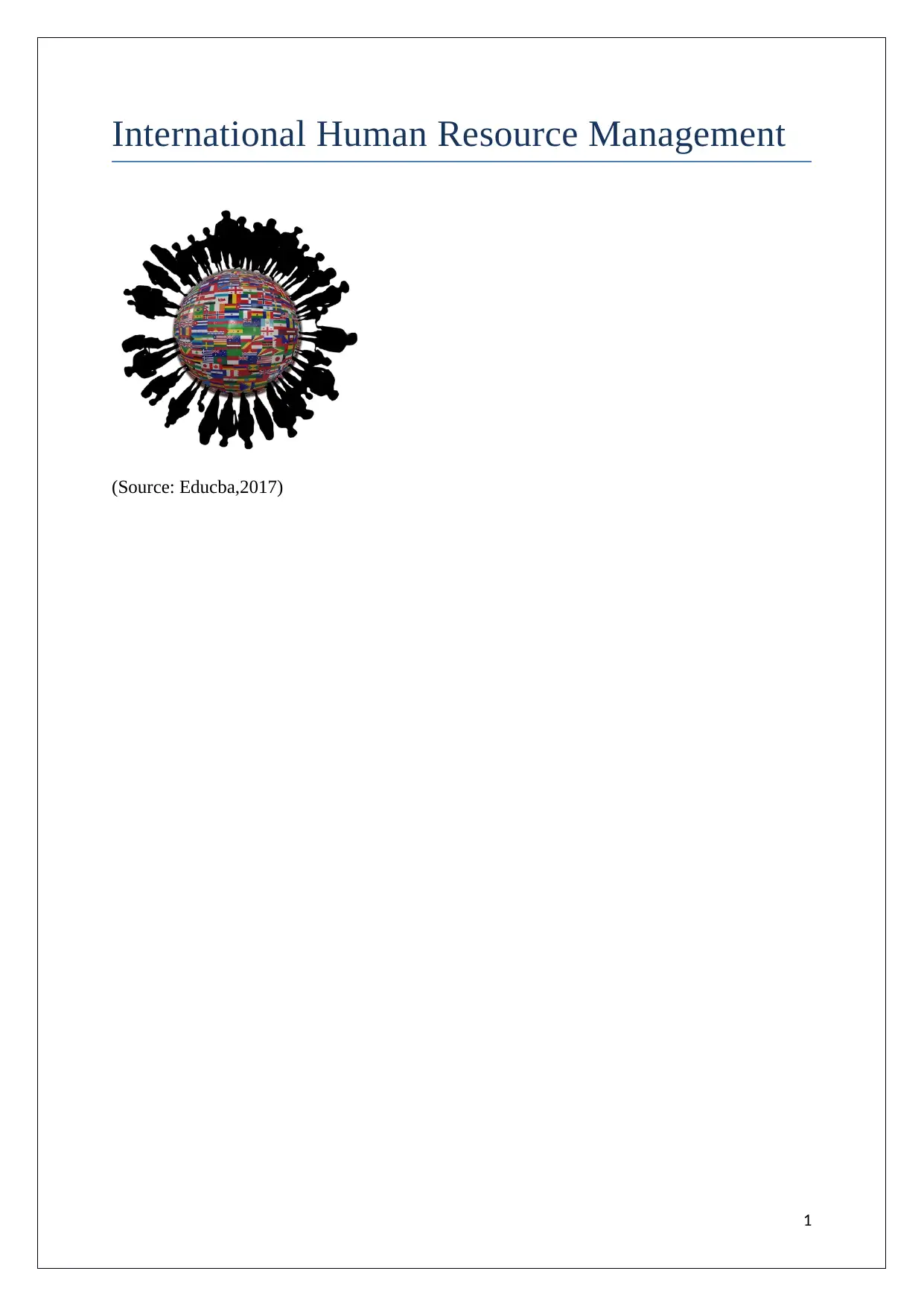
International Human Resource Management
(Source: Educba,2017)
1
(Source: Educba,2017)
1
Paraphrase This Document
Need a fresh take? Get an instant paraphrase of this document with our AI Paraphraser
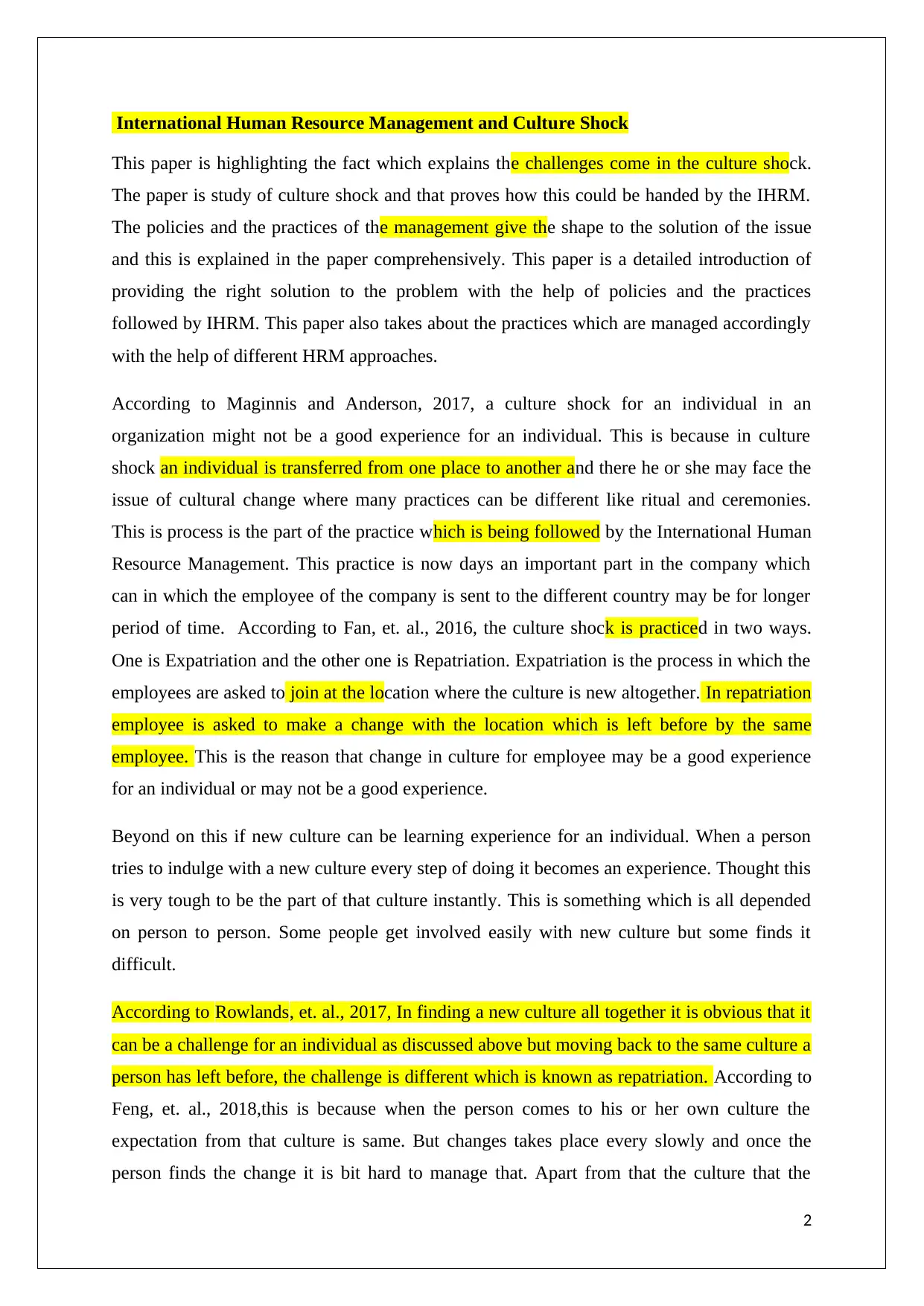
International Human Resource Management and Culture Shock
This paper is highlighting the fact which explains the challenges come in the culture shock.
The paper is study of culture shock and that proves how this could be handed by the IHRM.
The policies and the practices of the management give the shape to the solution of the issue
and this is explained in the paper comprehensively. This paper is a detailed introduction of
providing the right solution to the problem with the help of policies and the practices
followed by IHRM. This paper also takes about the practices which are managed accordingly
with the help of different HRM approaches.
According to Maginnis and Anderson, 2017, a culture shock for an individual in an
organization might not be a good experience for an individual. This is because in culture
shock an individual is transferred from one place to another and there he or she may face the
issue of cultural change where many practices can be different like ritual and ceremonies.
This is process is the part of the practice which is being followed by the International Human
Resource Management. This practice is now days an important part in the company which
can in which the employee of the company is sent to the different country may be for longer
period of time. According to Fan, et. al., 2016, the culture shock is practiced in two ways.
One is Expatriation and the other one is Repatriation. Expatriation is the process in which the
employees are asked to join at the location where the culture is new altogether. In repatriation
employee is asked to make a change with the location which is left before by the same
employee. This is the reason that change in culture for employee may be a good experience
for an individual or may not be a good experience.
Beyond on this if new culture can be learning experience for an individual. When a person
tries to indulge with a new culture every step of doing it becomes an experience. Thought this
is very tough to be the part of that culture instantly. This is something which is all depended
on person to person. Some people get involved easily with new culture but some finds it
difficult.
According to Rowlands, et. al., 2017, In finding a new culture all together it is obvious that it
can be a challenge for an individual as discussed above but moving back to the same culture a
person has left before, the challenge is different which is known as repatriation. According to
Feng, et. al., 2018,this is because when the person comes to his or her own culture the
expectation from that culture is same. But changes takes place every slowly and once the
person finds the change it is bit hard to manage that. Apart from that the culture that the
2
This paper is highlighting the fact which explains the challenges come in the culture shock.
The paper is study of culture shock and that proves how this could be handed by the IHRM.
The policies and the practices of the management give the shape to the solution of the issue
and this is explained in the paper comprehensively. This paper is a detailed introduction of
providing the right solution to the problem with the help of policies and the practices
followed by IHRM. This paper also takes about the practices which are managed accordingly
with the help of different HRM approaches.
According to Maginnis and Anderson, 2017, a culture shock for an individual in an
organization might not be a good experience for an individual. This is because in culture
shock an individual is transferred from one place to another and there he or she may face the
issue of cultural change where many practices can be different like ritual and ceremonies.
This is process is the part of the practice which is being followed by the International Human
Resource Management. This practice is now days an important part in the company which
can in which the employee of the company is sent to the different country may be for longer
period of time. According to Fan, et. al., 2016, the culture shock is practiced in two ways.
One is Expatriation and the other one is Repatriation. Expatriation is the process in which the
employees are asked to join at the location where the culture is new altogether. In repatriation
employee is asked to make a change with the location which is left before by the same
employee. This is the reason that change in culture for employee may be a good experience
for an individual or may not be a good experience.
Beyond on this if new culture can be learning experience for an individual. When a person
tries to indulge with a new culture every step of doing it becomes an experience. Thought this
is very tough to be the part of that culture instantly. This is something which is all depended
on person to person. Some people get involved easily with new culture but some finds it
difficult.
According to Rowlands, et. al., 2017, In finding a new culture all together it is obvious that it
can be a challenge for an individual as discussed above but moving back to the same culture a
person has left before, the challenge is different which is known as repatriation. According to
Feng, et. al., 2018,this is because when the person comes to his or her own culture the
expectation from that culture is same. But changes takes place every slowly and once the
person finds the change it is bit hard to manage that. Apart from that the culture that the
2
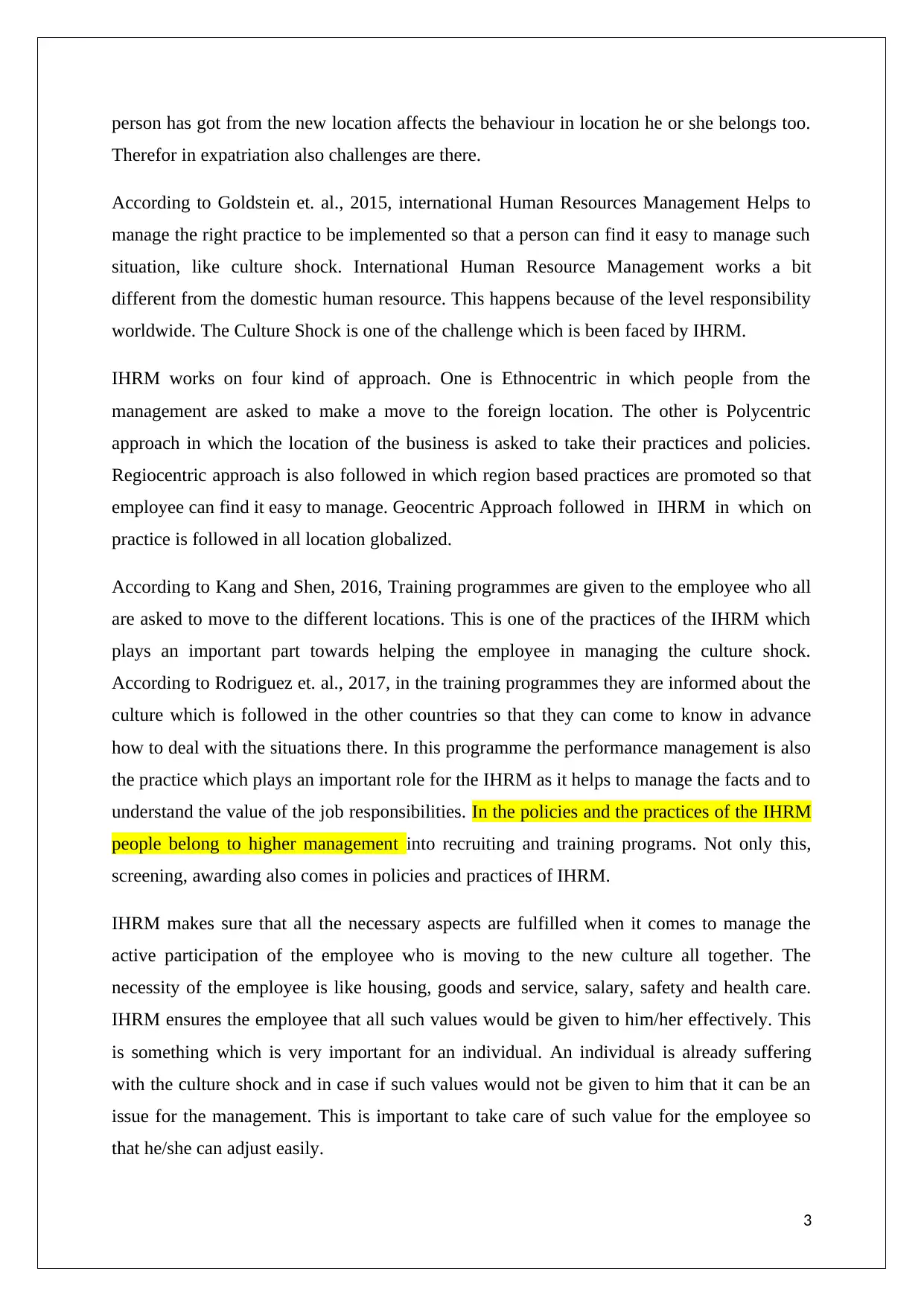
person has got from the new location affects the behaviour in location he or she belongs too.
Therefor in expatriation also challenges are there.
According to Goldstein et. al., 2015, international Human Resources Management Helps to
manage the right practice to be implemented so that a person can find it easy to manage such
situation, like culture shock. International Human Resource Management works a bit
different from the domestic human resource. This happens because of the level responsibility
worldwide. The Culture Shock is one of the challenge which is been faced by IHRM.
IHRM works on four kind of approach. One is Ethnocentric in which people from the
management are asked to make a move to the foreign location. The other is Polycentric
approach in which the location of the business is asked to take their practices and policies.
Regiocentric approach is also followed in which region based practices are promoted so that
employee can find it easy to manage. Geocentric Approach followed in IHRM in which on
practice is followed in all location globalized.
According to Kang and Shen, 2016, Training programmes are given to the employee who all
are asked to move to the different locations. This is one of the practices of the IHRM which
plays an important part towards helping the employee in managing the culture shock.
According to Rodriguez et. al., 2017, in the training programmes they are informed about the
culture which is followed in the other countries so that they can come to know in advance
how to deal with the situations there. In this programme the performance management is also
the practice which plays an important role for the IHRM as it helps to manage the facts and to
understand the value of the job responsibilities. In the policies and the practices of the IHRM
people belong to higher management into recruiting and training programs. Not only this,
screening, awarding also comes in policies and practices of IHRM.
IHRM makes sure that all the necessary aspects are fulfilled when it comes to manage the
active participation of the employee who is moving to the new culture all together. The
necessity of the employee is like housing, goods and service, salary, safety and health care.
IHRM ensures the employee that all such values would be given to him/her effectively. This
is something which is very important for an individual. An individual is already suffering
with the culture shock and in case if such values would not be given to him that it can be an
issue for the management. This is important to take care of such value for the employee so
that he/she can adjust easily.
3
Therefor in expatriation also challenges are there.
According to Goldstein et. al., 2015, international Human Resources Management Helps to
manage the right practice to be implemented so that a person can find it easy to manage such
situation, like culture shock. International Human Resource Management works a bit
different from the domestic human resource. This happens because of the level responsibility
worldwide. The Culture Shock is one of the challenge which is been faced by IHRM.
IHRM works on four kind of approach. One is Ethnocentric in which people from the
management are asked to make a move to the foreign location. The other is Polycentric
approach in which the location of the business is asked to take their practices and policies.
Regiocentric approach is also followed in which region based practices are promoted so that
employee can find it easy to manage. Geocentric Approach followed in IHRM in which on
practice is followed in all location globalized.
According to Kang and Shen, 2016, Training programmes are given to the employee who all
are asked to move to the different locations. This is one of the practices of the IHRM which
plays an important part towards helping the employee in managing the culture shock.
According to Rodriguez et. al., 2017, in the training programmes they are informed about the
culture which is followed in the other countries so that they can come to know in advance
how to deal with the situations there. In this programme the performance management is also
the practice which plays an important role for the IHRM as it helps to manage the facts and to
understand the value of the job responsibilities. In the policies and the practices of the IHRM
people belong to higher management into recruiting and training programs. Not only this,
screening, awarding also comes in policies and practices of IHRM.
IHRM makes sure that all the necessary aspects are fulfilled when it comes to manage the
active participation of the employee who is moving to the new culture all together. The
necessity of the employee is like housing, goods and service, salary, safety and health care.
IHRM ensures the employee that all such values would be given to him/her effectively. This
is something which is very important for an individual. An individual is already suffering
with the culture shock and in case if such values would not be given to him that it can be an
issue for the management. This is important to take care of such value for the employee so
that he/she can adjust easily.
3
⊘ This is a preview!⊘
Do you want full access?
Subscribe today to unlock all pages.

Trusted by 1+ million students worldwide
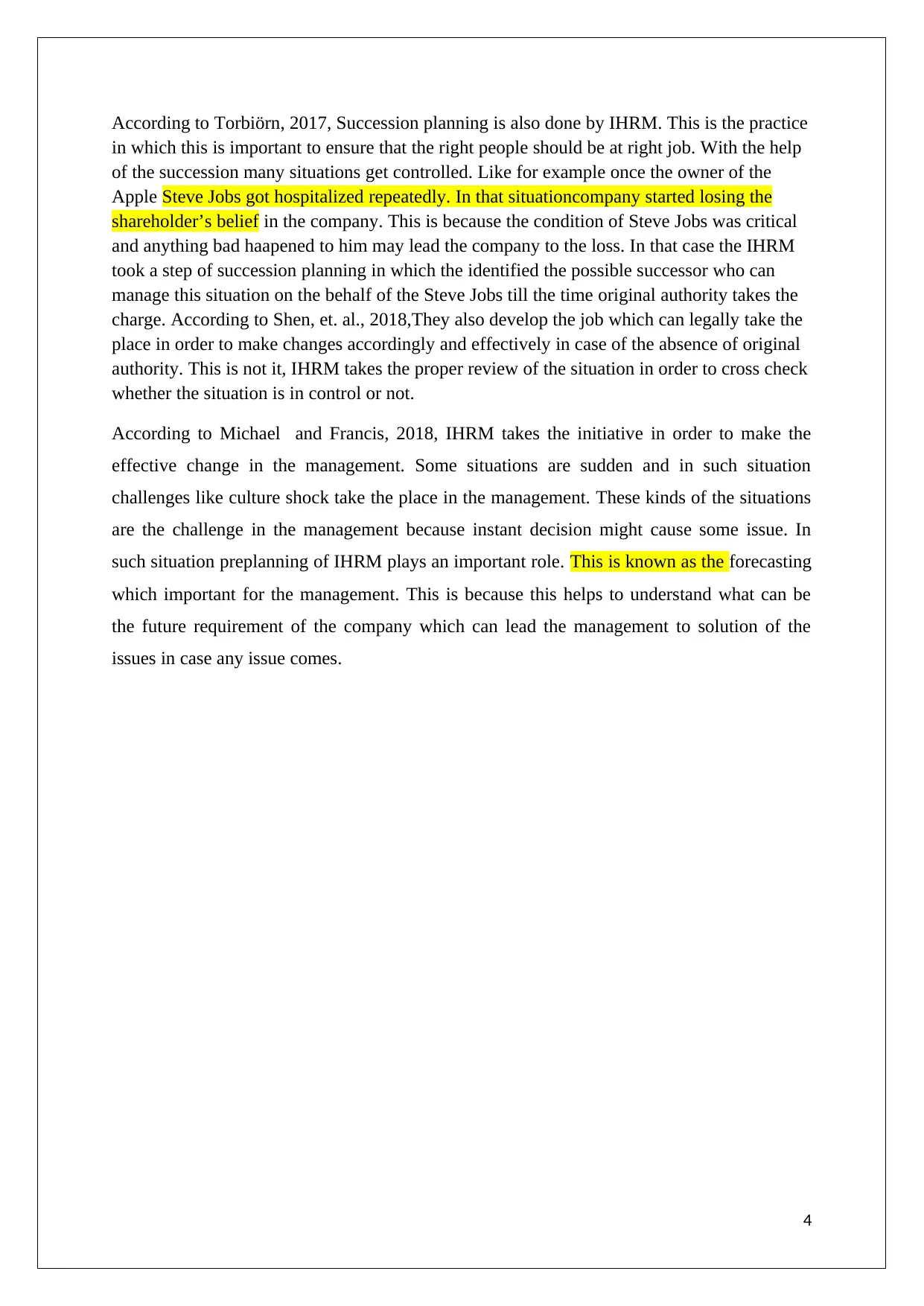
According to Torbiörn, 2017, Succession planning is also done by IHRM. This is the practice
in which this is important to ensure that the right people should be at right job. With the help
of the succession many situations get controlled. Like for example once the owner of the
Apple Steve Jobs got hospitalized repeatedly. In that situationcompany started losing the
shareholder’s belief in the company. This is because the condition of Steve Jobs was critical
and anything bad haapened to him may lead the company to the loss. In that case the IHRM
took a step of succession planning in which the identified the possible successor who can
manage this situation on the behalf of the Steve Jobs till the time original authority takes the
charge. According to Shen, et. al., 2018,They also develop the job which can legally take the
place in order to make changes accordingly and effectively in case of the absence of original
authority. This is not it, IHRM takes the proper review of the situation in order to cross check
whether the situation is in control or not.
According to Michael and Francis, 2018, IHRM takes the initiative in order to make the
effective change in the management. Some situations are sudden and in such situation
challenges like culture shock take the place in the management. These kinds of the situations
are the challenge in the management because instant decision might cause some issue. In
such situation preplanning of IHRM plays an important role. This is known as the forecasting
which important for the management. This is because this helps to understand what can be
the future requirement of the company which can lead the management to solution of the
issues in case any issue comes.
4
in which this is important to ensure that the right people should be at right job. With the help
of the succession many situations get controlled. Like for example once the owner of the
Apple Steve Jobs got hospitalized repeatedly. In that situationcompany started losing the
shareholder’s belief in the company. This is because the condition of Steve Jobs was critical
and anything bad haapened to him may lead the company to the loss. In that case the IHRM
took a step of succession planning in which the identified the possible successor who can
manage this situation on the behalf of the Steve Jobs till the time original authority takes the
charge. According to Shen, et. al., 2018,They also develop the job which can legally take the
place in order to make changes accordingly and effectively in case of the absence of original
authority. This is not it, IHRM takes the proper review of the situation in order to cross check
whether the situation is in control or not.
According to Michael and Francis, 2018, IHRM takes the initiative in order to make the
effective change in the management. Some situations are sudden and in such situation
challenges like culture shock take the place in the management. These kinds of the situations
are the challenge in the management because instant decision might cause some issue. In
such situation preplanning of IHRM plays an important role. This is known as the forecasting
which important for the management. This is because this helps to understand what can be
the future requirement of the company which can lead the management to solution of the
issues in case any issue comes.
4
Paraphrase This Document
Need a fresh take? Get an instant paraphrase of this document with our AI Paraphraser
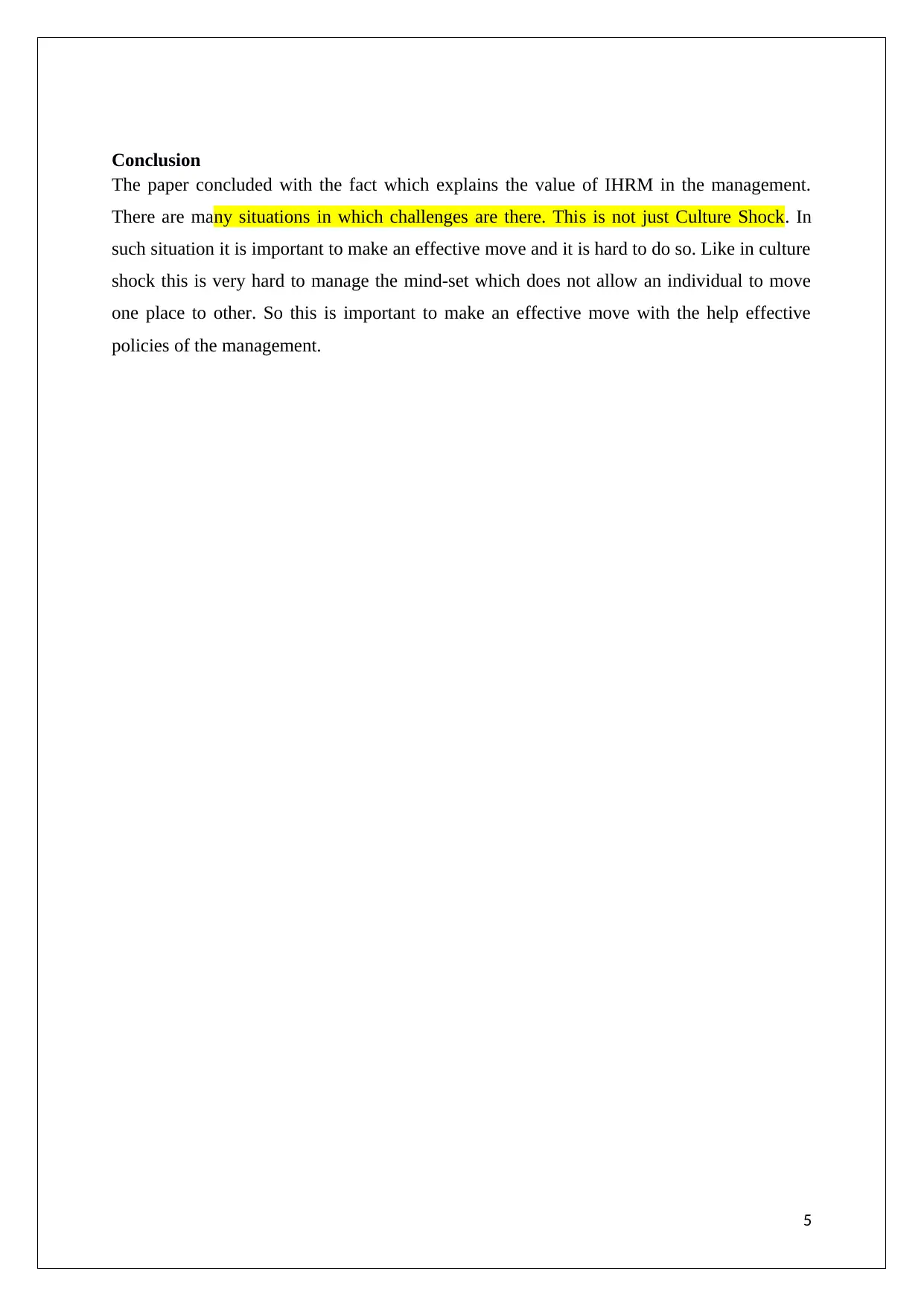
Conclusion
The paper concluded with the fact which explains the value of IHRM in the management.
There are many situations in which challenges are there. This is not just Culture Shock. In
such situation it is important to make an effective move and it is hard to do so. Like in culture
shock this is very hard to manage the mind-set which does not allow an individual to move
one place to other. So this is important to make an effective move with the help effective
policies of the management.
5
The paper concluded with the fact which explains the value of IHRM in the management.
There are many situations in which challenges are there. This is not just Culture Shock. In
such situation it is important to make an effective move and it is hard to do so. Like in culture
shock this is very hard to manage the mind-set which does not allow an individual to move
one place to other. So this is important to make an effective move with the help effective
policies of the management.
5
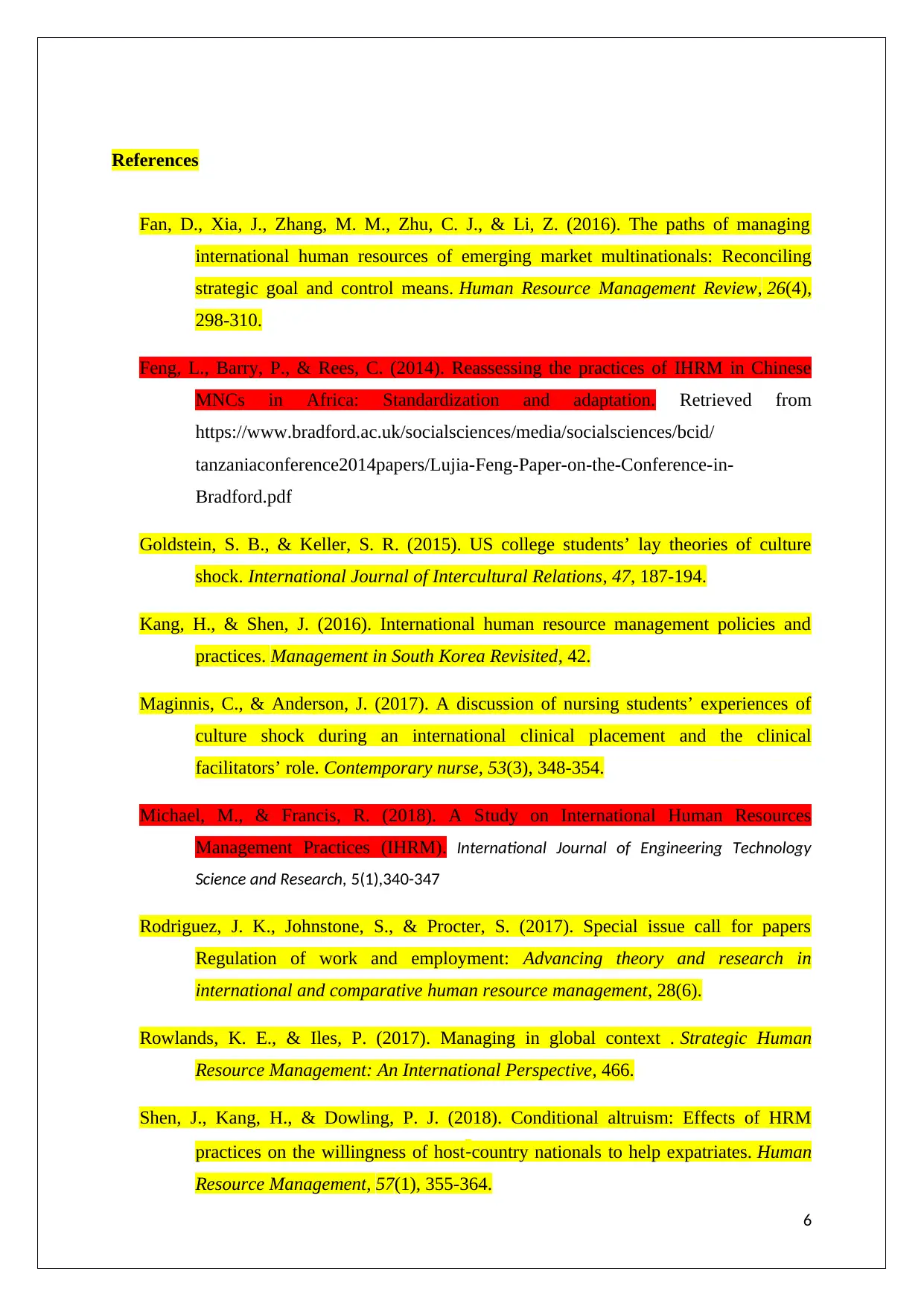
References
Fan, D., Xia, J., Zhang, M. M., Zhu, C. J., & Li, Z. (2016). The paths of managing
international human resources of emerging market multinationals: Reconciling
strategic goal and control means. Human Resource Management Review, 26(4),
298-310.
Feng, L., Barry, P., & Rees, C. (2014). Reassessing the practices of IHRM in Chinese
MNCs in Africa: Standardization and adaptation. Retrieved from
https://www.bradford.ac.uk/socialsciences/media/socialsciences/bcid/
tanzaniaconference2014papers/Lujia-Feng-Paper-on-the-Conference-in-
Bradford.pdf
Goldstein, S. B., & Keller, S. R. (2015). US college students’ lay theories of culture
shock. International Journal of Intercultural Relations, 47, 187-194.
Kang, H., & Shen, J. (2016). International human resource management policies and
practices. Management in South Korea Revisited, 42.
Maginnis, C., & Anderson, J. (2017). A discussion of nursing students’ experiences of
culture shock during an international clinical placement and the clinical
facilitators’ role. Contemporary nurse, 53(3), 348-354.
Michael, M., & Francis, R. (2018). A Study on International Human Resources
Management Practices (IHRM). International Journal of Engineering Technology
Science and Research, 5(1),340-347
Rodriguez, J. K., Johnstone, S., & Procter, S. (2017). Special issue call for papers
Regulation of work and employment: Advancing theory and research in
international and comparative human resource management, 28(6).
Rowlands, K. E., & Iles, P. (2017). Managing in global context . Strategic Human
Resource Management: An International Perspective, 466.
Shen, J., Kang, H., & Dowling, P. J. (2018). Conditional altruism: Effects of HRM
practices on the willingness of host‐country nationals to help expatriates. Human
Resource Management, 57(1), 355-364.
6
Fan, D., Xia, J., Zhang, M. M., Zhu, C. J., & Li, Z. (2016). The paths of managing
international human resources of emerging market multinationals: Reconciling
strategic goal and control means. Human Resource Management Review, 26(4),
298-310.
Feng, L., Barry, P., & Rees, C. (2014). Reassessing the practices of IHRM in Chinese
MNCs in Africa: Standardization and adaptation. Retrieved from
https://www.bradford.ac.uk/socialsciences/media/socialsciences/bcid/
tanzaniaconference2014papers/Lujia-Feng-Paper-on-the-Conference-in-
Bradford.pdf
Goldstein, S. B., & Keller, S. R. (2015). US college students’ lay theories of culture
shock. International Journal of Intercultural Relations, 47, 187-194.
Kang, H., & Shen, J. (2016). International human resource management policies and
practices. Management in South Korea Revisited, 42.
Maginnis, C., & Anderson, J. (2017). A discussion of nursing students’ experiences of
culture shock during an international clinical placement and the clinical
facilitators’ role. Contemporary nurse, 53(3), 348-354.
Michael, M., & Francis, R. (2018). A Study on International Human Resources
Management Practices (IHRM). International Journal of Engineering Technology
Science and Research, 5(1),340-347
Rodriguez, J. K., Johnstone, S., & Procter, S. (2017). Special issue call for papers
Regulation of work and employment: Advancing theory and research in
international and comparative human resource management, 28(6).
Rowlands, K. E., & Iles, P. (2017). Managing in global context . Strategic Human
Resource Management: An International Perspective, 466.
Shen, J., Kang, H., & Dowling, P. J. (2018). Conditional altruism: Effects of HRM
practices on the willingness of host‐country nationals to help expatriates. Human
Resource Management, 57(1), 355-364.
6
⊘ This is a preview!⊘
Do you want full access?
Subscribe today to unlock all pages.

Trusted by 1+ million students worldwide
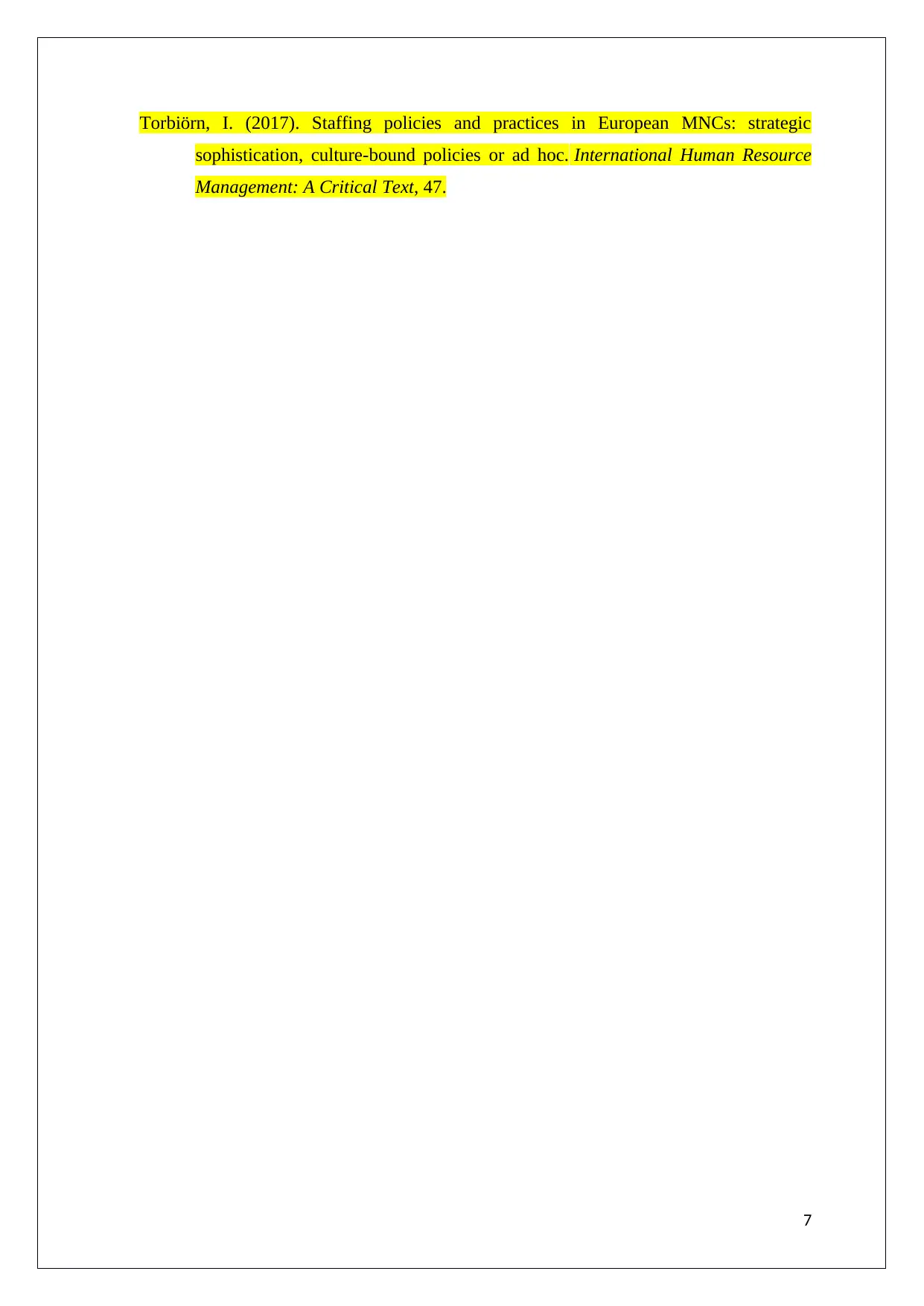
Torbiörn, I. (2017). Staffing policies and practices in European MNCs: strategic
sophistication, culture-bound policies or ad hoc. International Human Resource
Management: A Critical Text, 47.
7
sophistication, culture-bound policies or ad hoc. International Human Resource
Management: A Critical Text, 47.
7
1 out of 7
Related Documents
Your All-in-One AI-Powered Toolkit for Academic Success.
+13062052269
info@desklib.com
Available 24*7 on WhatsApp / Email
![[object Object]](/_next/static/media/star-bottom.7253800d.svg)
Unlock your academic potential
Copyright © 2020–2026 A2Z Services. All Rights Reserved. Developed and managed by ZUCOL.



